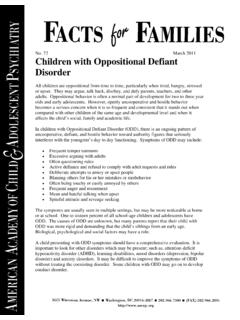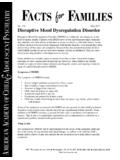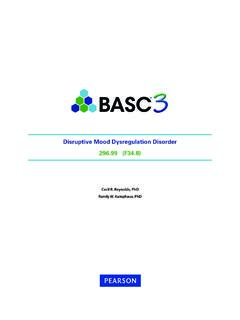Transcription of Effectiveness of Collaborative Problem Solving in ...
1 BRIEF REPORTSE ffectiveness of Collaborative Problem Solving in AffectivelyDysregulated children with oppositional - defiant Disorder: Initial FindingsRoss W. Greene and J. Stuart AblonMassachusetts General Hospital and Harvard Medical SchoolMichael C. MonuteauxMassachusetts General HospitalJennifer C. GoringVirginia Polytechnic Institute and State UniversityAude HeninMassachusetts General Hospital and Harvard Medical SchoolLauren Raezer-BlakelyHarvard Medical School and children s HospitalGwenyth EdwardsDelta Consultants of South CountyJennifer MarkeySuffolk UniversitySarah RabbittMassachusetts General HospitalOppositional- defiant disorder(ODD) refers to a recurrent pattern of negativistic, defiant , disobedient, andhostile behavior toward authority figures. Research has shown that children with ODD and comorbid mooddisorders may be at particular risk for long-term adverse outcomes, including conduct disorder.
2 In this study,the authors examined the Effectiveness of a cognitive behavioral model of intervention called collaborativeproblem Solving (CPS) in comparison with parent training (PT) in 47 affectively dysregulated children withODD. Results indicate that CPS produced significant improvements across multiple domains of functioningat posttreatment and at 4-month follow-up. These improvements were in all instances equivalent, and in manyinstances superior, to the improvements produced by PT. Implications of these findings for further researchon and treatment selection in children with ODD are to theDiagnostic and Statistical Manual of MentalDisorders(4th ed.;DSM IV;American Psychiatric Association,1994), oppositional - defiant disorder(ODD) refers to a recurrentchildhood pattern of developmentally inappropriate levels of neg-ativistic, defiant , disobedient, and hostile behavior toward author-ity figures.
3 ODD-related behaviors have been shown to haveextremely deleterious effects on interactions between children whoexhibit such behaviors and their adult caretakers (Stormschak,Speltz, DeKlyen, & Greenberg, 1997). children with ODD withcomorbid mood disorders (major depression and bipolar disorder)are at particular risk for adverse outcomes, including the develop-ment of conduct disorder (CD; Greene, Biederman, et al., 2002).To our knowledge, researchers have yet to examine differentialeffects of psychosocial treatment in samples of ODD children withand without comorbid mood , diverse psychosocial treatment approaches have beenapplied to children s ODD-related behaviors. Models known al-ternatively as parent training (PT) and behavioral family therapyhave focused primarily on altering patterns of parental disciplinethat contribute to the development of oppositional behavior andproblematic parent child exchanges.
4 Skills typically taught toparents in such programs include positive attending, use of appro-priate commands, contingent attention and reinforcement, and useof a time-out procedure (McMahon & Wells, 1998). In general,research has documented the efficacy of these procedures (seeBrestan & Eyberg, 1998), and several intervention programs em-anating from these models have been identified as either wellestablished or as probably W. Greene, J. Stuart Ablon, and Aude Henin, Department ofPsychiatry, Massachusetts General Hospital, Boston, and Harvard MedicalSchool; Michael C. Monuteaux and Sarah Rabbitt, Department of Psychi-atry, Massachusetts General Hospital; Jennifer C. Goring, Department ofPsychology, Virginia Polytechnic Institute and State University; LaurenRaezer-Blakely, Harvard Medical School, and Department of Psychology, children s Hospital, Boston; Gwenyth Edwards, Delta Consultants ofSouth County, Wakefield, Rhode Island; Jennifer Markey, Department ofPsychology, Suffolk for this study was provided by the Theodore and Vada StanleyFoundation.
5 We thank Caryn L. Carlson (and her students), John Weisz,and Thomas H. Ollendick for their comments on drafts of this concerning this article should be addressed to Ross , Collaborative Problem Solving Institute, Department of Psychia-try, Massachusetts General Hospital, 313 Washington Street, Suite 402,Newton, MA 02458. E-mail: of Consulting and Clinical PsychologyCopyright 2004 by the American Psychological Association2004, Vol. 72, No. 6, 1157 11640022-006X/04/$ DOI: models of intervention have placed relatively greateremphasis on cognitive factors underlying ODD rather than onbehavior per se (Crick & Dodge, 1996; Kendall, 1985, 1991).These models have focused on addressing the cognitive deficien-cies (a lack or insufficient amount of cognitive activity in situa-tions requiring such activity) and/or cognitive distortions (activebut inaccurate or maladaptive cognitive processing) of opposi-tional or aggressive children .
6 Several such intervention modelshave been identified as probably , it has been argued that neither of the above categoriesof intervention directly addresses the reciprocal adult child pro-cesses giving rise to oppositional behavior in a child (Greene,Ablon, & Goring, 2002). PT programs, by concentrating on alter-ing patterns of inept parental discipline, focus primarily on onlyone component (the parent) of parent child transactions. Simi-larly, in their emphasis on addressing the cognitive distortions anddeficiencies of oppositional children , cognitive behavioral modelsfocus on only one component (the child) of parent cognitive behavioral model of intervention known ascollab-orative Problem Solving (CPS; Greene, Ablon, & Goring, 2002)differs from many PT programs in its emphasis on facilitatingadult child Problem Solving (rather than on teaching and motivat-ing children to comply with adult directives) and differs from othercognitive behavioral models of intervention in its emphasis ontraining skills proximally to points of performance and helpingadults and children develop the skills to resolve issues of disagree-ment present study represents the first examination of the effec-tiveness of the CPS approach.
7 In this study, CPS was comparedwith PT in affectively dysregulated children meetingDSM IVdiagnostic criteria for ODD. We definedaffectively dysregulatedas those children with ODD who had at least subthreshold featuresof either severe major depression or juvenile bipolar disorder. Asnoted above, this population of children with ODD has been shownto be at heightened risk for adverse 50 children with ODD between the ages of 4 and 12 years whobegan treatment were randomly assigned ( with a 3:2 randomizationscheme) to CPS or PT. Three children (2 in the CPS condition and 1 in thePT condition) did not complete treatment. Thus, 28 children completedtreatment in the CPS condition, and 19 children completed treatment in thePT condition. All children were clinically referred (to an outpatient mentalhealth clinic specializing in the treatment of disruptive behavior disordersat a university teaching hospital); all met full diagnostic criteria for ODD;none met full diagnostic criteria for CD at the time of enrollment in thestudy (many had subthreshold features of CD).
8 All children also had atleast subthreshold features of either juvenile bipolar disorder or majordepression (defined as more than half of the symptoms needed to meetcriteria for the diagnosis). Although bipolar disorder remains a controver-sial diagnosis in children (the lack of universally accepted criteria for thisdisorder in children and the use of adult criteria to make the diagnosis inchildren continue to constrain its validity), researchers have found thatusing adapted adult criteria for bipolar disorder does identify a group ofchildren who are affectively dysregulated , significantly impaired, and atsignificant risk for adverse long-term outcomes ( , Wozniak et al.,1995). children were ineligible to participate if they had an estimated full-scaleIQ below 80 or were actively suicidal or homicidal on entry into the final sample included 5 children of minority ethnicity (4 AfricanAmericans and 1 Asian American).
9 Of the children who completed treat-ment, 87% (PT,n 16; CPS,n 25) were available for follow-upassessment at 4-month eligibility was established with a two-stage assessment pro-cess that involved a telephone diagnostic screening followed by a fulldiagnostic interview for those who met initial entry criteria. If (a) criteriafor ODD were met, (b) criteria for CD were not fully met, (c) criteria forsevere major depression or bipolar disorder were at least partially met, and(d) no exclusion criteria were met, then children and their parents wereenrolled in the active-treatment phase of the ConditionsThose families assigned to the PT condition received Barkley s (1997)10-week behavior management program, consisting of the following treat-ment components: (a) discussing and educating parents about the causes ofchildren s defiant behavior, (b) instructing parents on positive attendingthrough use of special time, (c) training parents to use attending skills toincrease compliant behavior, (d) increasing the Effectiveness of parentalcommands, (e) implementing a contingency management program, (f)using the time-out procedure, (g) managing children s behavior in publicplaces, and (h) using a daily school home report card.
10 This treatmentprogram is manualized, with specified weekly session content. Families inthis treatment condition received 10 weeks of treatment, as prescribed bythe treatment manual. Treatment sessions in this condition were attendedprimarily by parents, with identified children included as indicated by thetraining families assigned to the CPS condition received a model ofpsychosocial treatment delineated by Greene and colleagues (Greene,Ablon, & Goring, 2002; Greene, Ablon, Goring, Fazio, & Morse, 2003).The CPS approach aims to help adults achieve the following treatmentgoals: (a) understand the cognitive factors that may contribute to aggres-sive outbursts, most notably in the domains of emotion regulation, frus-tration tolerance, Problem Solving , and adaptability skills; (b) becomecognizant of three basic strategies (known as the baskets framework) forhandling unmet expectations, including imposition of adult will, CPS, andremoving the expectation; (c) recognize the impact of each of these threestrategies on adult child interactions; and (d) become proficient, alongwith their children , at CPS as a means of resolving disagreements anddefusing potentially conflictual situations so as to reduce the likelihood ofaggressive outbursts.





